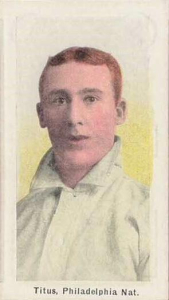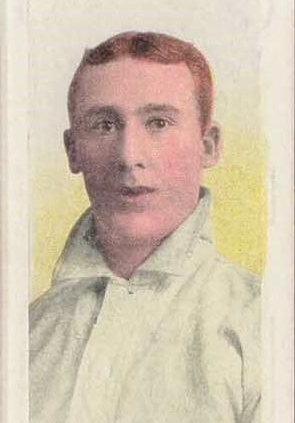John Titus
 “Silent John” Titus was a strong-armed outfielder who recorded more than 20 assists for seven straight seasons, but he was better known for his quiet demeanor, his mustache, his selectivity at the plate, and the ubiquitous toothpick in his mouth. “Titus had one of the best batting eyes I ever saw,” said Pete Alexander, who played with Titus on the Phillies during the early part of his career. “He would take his position at the plate with the easiest and most confident air in the world. If the ball was an inch outside of the plate, he would watch it go by and never bat an eye lash. If it was an inch inside, he wouldn’t move. He would just draw in his stomach and let the ball pass. But if you put the ball over the plate, he would whale the cover off. It used to exasperate me merely to watch him. Many a time I have said to myself, If I were pitching, Old Man, I’d knock that toothpick out of your mouth and maybe then you’d move over.”
“Silent John” Titus was a strong-armed outfielder who recorded more than 20 assists for seven straight seasons, but he was better known for his quiet demeanor, his mustache, his selectivity at the plate, and the ubiquitous toothpick in his mouth. “Titus had one of the best batting eyes I ever saw,” said Pete Alexander, who played with Titus on the Phillies during the early part of his career. “He would take his position at the plate with the easiest and most confident air in the world. If the ball was an inch outside of the plate, he would watch it go by and never bat an eye lash. If it was an inch inside, he wouldn’t move. He would just draw in his stomach and let the ball pass. But if you put the ball over the plate, he would whale the cover off. It used to exasperate me merely to watch him. Many a time I have said to myself, If I were pitching, Old Man, I’d knock that toothpick out of your mouth and maybe then you’d move over.”
John Franklin Titus was born to Theodore and Agnes (Uren) Titus on February 21, 1876, in St. Clair, Pennsylvania, about 100 miles northwest of Philadelphia. His father was a native of Easton, Pennsylvania, and his mother was born in England. Before his career in professional baseball, John worked in the local coalmines and served in the army during the Spanish-American War. At age 22 he joined Company K, 8th Regiment of the Pennsylvania Infantry. The company initially reported to Camp Hastings in Mount Gretna, Pennsylvania, then moved on to Georgia and Virginia. Several outbreaks of typhoid during the summer of 1898 necessitated a move back to its home state, however, and by that time most of the fighting had ceased.
After Company K disbanded, Titus returned home and played basketball for a team in St. Clair that decided to all grow moustaches. He ended up keeping his throughout most of his baseball career, at a time when very few players sported facial hair. Titus played semipro baseball in nearby Pottsville, and in 1903 he signed on with Concord, New Hampshire, of the Class B New England League. His stay in the minors was short. In early June Titus was tearing up the league with a .407 batting average when the Philadelphia Phillies purchased his contract for $1,700. He was actually 27 years old at the time, but newspaper accounts listed him as only 24.
Titus made his major league debut on June 8, 1903, replacing Shad Barry in left field and batting cleanup. He saved a baseball used in that game for the rest of his life—even though he went hitless in four at-bats as the Phillies lost to the Pirates, 2-0, Pittsburgh’s sixth consecutive shutout. But the following afternoon Titus knocked home a fourth-inning run that snapped the Pittsburgh pitching staff’s string of 56 straight scoreless innings. He went on to bat .286 in 72 games that season. “They changed his style when he joined the Phillies,” wrote Pottsville sportswriter Walter Farquhar decades later. “It was the fashion in those days to choke the bat and meet the ball with a short kick instead of the long, rhythmic swing which Jack had when he played [in Pottsville]. His swing here was comparable to that of Joe DiMaggio, except that Titus batted and threw left-handed.”
The career .282 hitter improved his batting average over each of the next two seasons, putting together a career year at age 29 in 1905. Switching corner outfield positions with teammate Sherry Magee, who had problems playing right field, Titus finished in the NL’s top five in slugging percentage (.436), total bases (239), doubles (36), runs batted in (89), and walks (69). Perhaps his best day as a Phillie occurred on May 25, 1907. Philadelphia trailed Brooklyn, 5-0, in the first game of a doubleheader when Titus blasted a two-run triple in the sixth inning and scored on a passed ball. Two innings later, he again tripled home two runs, tying the game at 5-5, and scored the eventual winning run on an error. In the second game Titus doubled, tripled, drove in three runs and scored one himself as Philadelphia won, 7-4, sweeping the Saturday twin bill.
Though he remained a solid, dependable player, appearing in at least 143 games every summer in his first seven seasons, “Silent John” garnered less attention and adulation than his more volatile and outspoken teammates. Kid Gleason once said that “he doesn’t even make any noise when he spits.” Titus was also known as “Tight Ass”—a play on his last name and a fair description of his spending habits: Titus saved all his paychecks until the end of the season, and then cashed them all at once. It is believed that he was never thrown out of a single game in his entire career. New York Giants catcher Roger Bresnahan once tried to rattle him by snatching the toothpick out of his mouth and grinding it into the dirt behind home plate. Titus flushed with anger and spewed a loud string of obscenities. The display was so out of character for the taciturn Phillie that Bresnahan actually apologized.
Eventually National League pitchers detected a pattern with Titus and his ever-present toothpick. He kept the sliver of wood in the corner of his mouth until he got the green light to swing at a pitch, then he’d shift it to the center of his mouth. After one alert pitcher noticed the subtle giveaway, word got around the league. Titus refused to abandon the toothpick, so he was forced to adjust his mannerisms.
Philadelphia led the NL in late May 1911 when Titus broke his leg sliding into home plate in a game against the Cardinals. By the time he returned to the lineup, the Phillies had sunk to third and the once-fleet outfielder had lost a lot of his speed—after stealing more than 20 bases in each of the previous three seasons, he totaled only 17 in the next three years combined. On June 21, 1912, the Phillies traded Titus to the Boston Braves. He finished the season strong, batting .325 in 96 games for Boston, and began 1913 as the Braves’ starting right fielder. But when manager George Stallings sorted out his team’s many outfielders, he relegated Titus to the bench. The Braves ended up selling him to Kansas City of the American Association after he suffered another broken leg in July.
At the beginning of the 1914 season Titus was 38 years old, though the papers now said he was 31. In late April he suffered a fractured skull and remained unconscious for several hours after being beaned by Bill Burns, a former teammate who was later linked to the 1919 World Series scandal. Titus remained out of the lineup for two months. The following summer he was hitting only .263 when Kansas City released him on July 22. He decided to retire.
On September 15, 1915, Titus married Ethel Stone, his 17-year-old next-door neighbor in St. Clair. Little is known about his life after baseball. John Titus died at age 66 at his home in St. Clair on January 7, 1943. His wife and his brother, Harry, survived him. Local obituaries do not mention any children. Titus was buried with full military honors at a funeral attended by many local veterans of the Spanish-American War.
Note: A slightly different version of this biography appeared in Tom Simon, ed., Deadball Stars of the National League (Washington, D.C.: Brassey’s, Inc., 2004).
Sources
For this biography, the author used a number of contemporary sources, especially those found in the subject’s file at the National Baseball Hall of Fame Library.
Full Name
John Franklin Titus
Born
February 21, 1876 at St. Clair, PA (USA)
Died
January 8, 1943 at St. Clair, PA (USA)
If you can help us improve this player’s biography, contact us.


